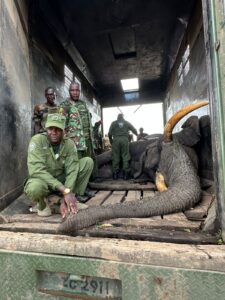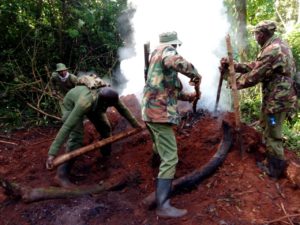 Mara Elephant Project rangers remained adaptive and ready for the growing threats to wildlife, communities and habitat in the Mara due to COVID-19. As was projected, we are seeing concrete evidence that bushmeat poaching and habitat destruction are on the rise and continuing our efforts alongside partners is crucial right now. pictured left: MEP rangers destroying a charcoal kiln on May 26.
Mara Elephant Project rangers remained adaptive and ready for the growing threats to wildlife, communities and habitat in the Mara due to COVID-19. As was projected, we are seeing concrete evidence that bushmeat poaching and habitat destruction are on the rise and continuing our efforts alongside partners is crucial right now. pictured left: MEP rangers destroying a charcoal kiln on May 26.
Poaching in Mara North Conservancy (MNC) has been unheard of for over a decade but in May, two suspects were arrested for bushmeat poaching during a joint operation conducted by MNC, Kenya Wildlife Service (KWS) and MEP rangers. In total, MEP rangers along with partners confiscated a total of 250 kg of bushmeat and arrested 11 bushmeat poaching suspects in May alone. We confiscated a total of 270 kg of bushmeat and arrested 12 total bushmeat poachers in all of the second quarter. Bushmeat is often obtained using snares, which we saw an increase of during our patrols. In total, rangers removed 74 snares in the second quarter.
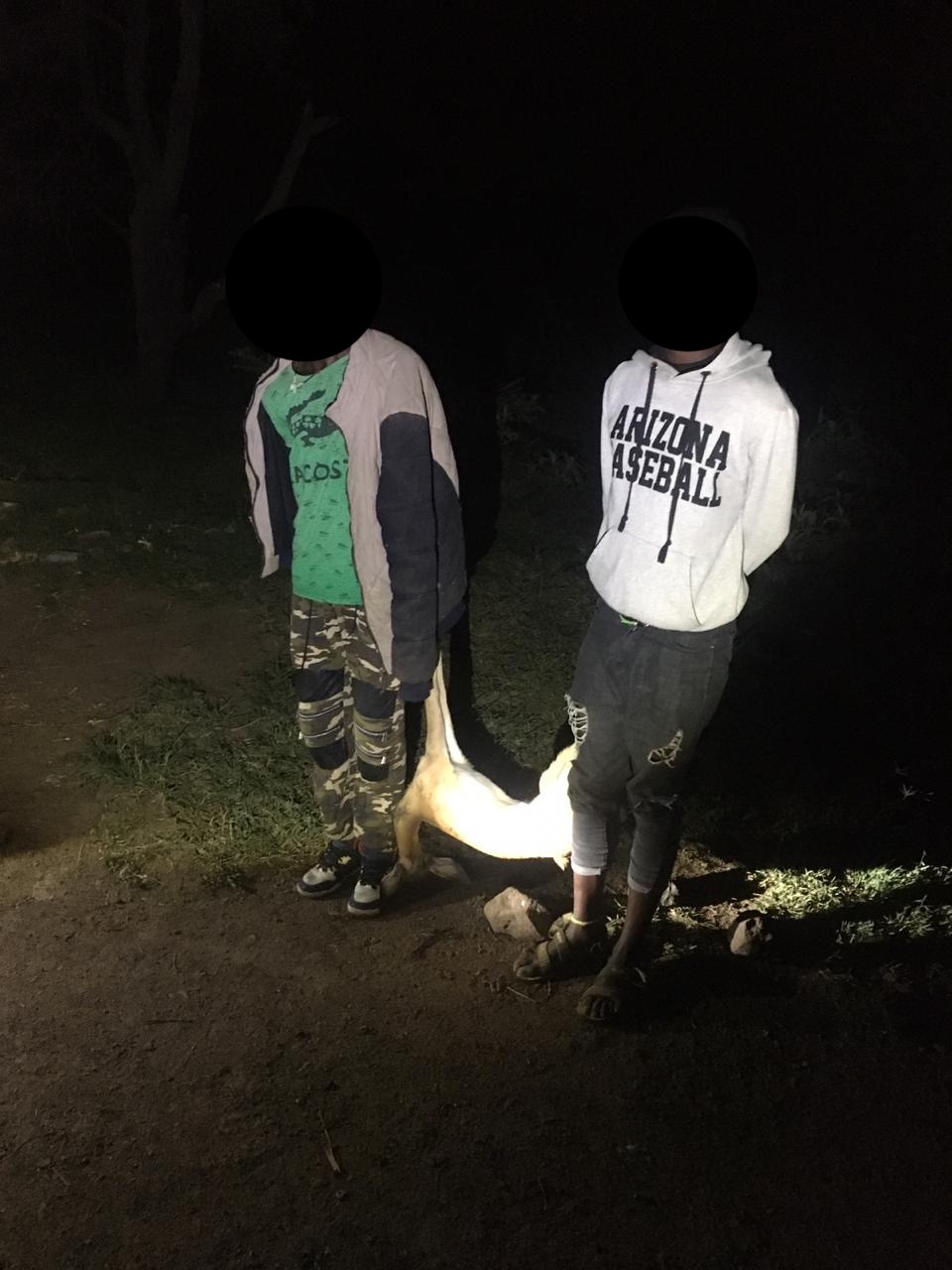
Two suspects arrested for bushmeat poaching on May 19.
The vegetation greenness index (NDVI) measured in the range of the elephants in the Mau Forest was outside the 95th percentile range of values measured historically and was generally much higher than the average across all regions that elephants are ranging. Which means, in the Mau our Sheldrick Wildlife Trust team was majorly affected by the flooding and could not cross many of the rivers which are normally streams. Despite this, MEP rangers on the SWT Mau De-Snaring Unit together with Kenya Forest Service (KFS) and Bongo Surveillance Project (BSP) removed a total of 30 snares during their joint patrols in May and planted trees in the Emitik area in April.
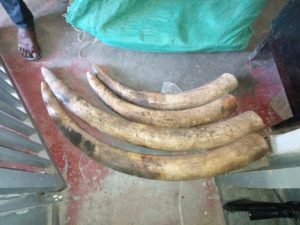 In terms of ivory seizures and related arrests, MEP and KWS seized a total of 40 kg of ivory and arrested one suspect in two separate operations. On May 29, KWS and MEP personnel recovered 4 pieces of elephant ivory weighing 37 kg at Ngorengore. Then, in June, MEP intelligence led KWS to an ivory recovery of 3 kg and the arrest of one suspect in Karen Shopping Center. pictured left: The 37 kg of ivory seized on May 29.
In terms of ivory seizures and related arrests, MEP and KWS seized a total of 40 kg of ivory and arrested one suspect in two separate operations. On May 29, KWS and MEP personnel recovered 4 pieces of elephant ivory weighing 37 kg at Ngorengore. Then, in June, MEP intelligence led KWS to an ivory recovery of 3 kg and the arrest of one suspect in Karen Shopping Center. pictured left: The 37 kg of ivory seized on May 29.
While remaining vigilant about poaching, MEP rangers continued to shutdown other illegal activities in the Mara alongside partners. In June, we recorded the highest number of illegal logging incidents since the inception of MEP. The pressures put on the economy have increased due to the effect of COVID-19 on the tourism industry. The halt of tourist generated revenue in the Mara has meant more people are out of work, which results in food insecurity and an increase in illegal activities. MEP rangers have been patrolling alongside KWS, KFS, BSP and MNC. The three forest areas we work in are taking a real hit with the increase in illegal activities and as a result, we’ve increased our efforts. In total, in the second quarter, MEP rangers confiscated 7,911 illegal timbers and posts, 11 power saws, 280 sacks of charcoal, arrested 52 suspects for habitat destruction activities and destroyed 63 kilns.
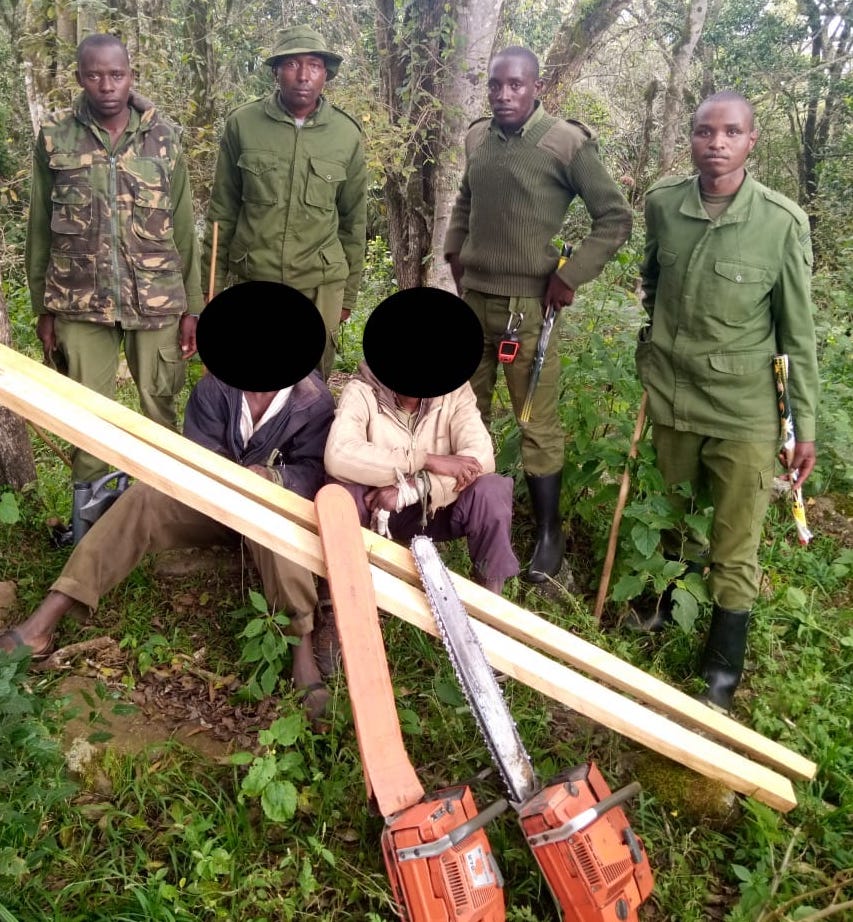
The Loita team arrested two suspects with power saws cutting down a podo tree.
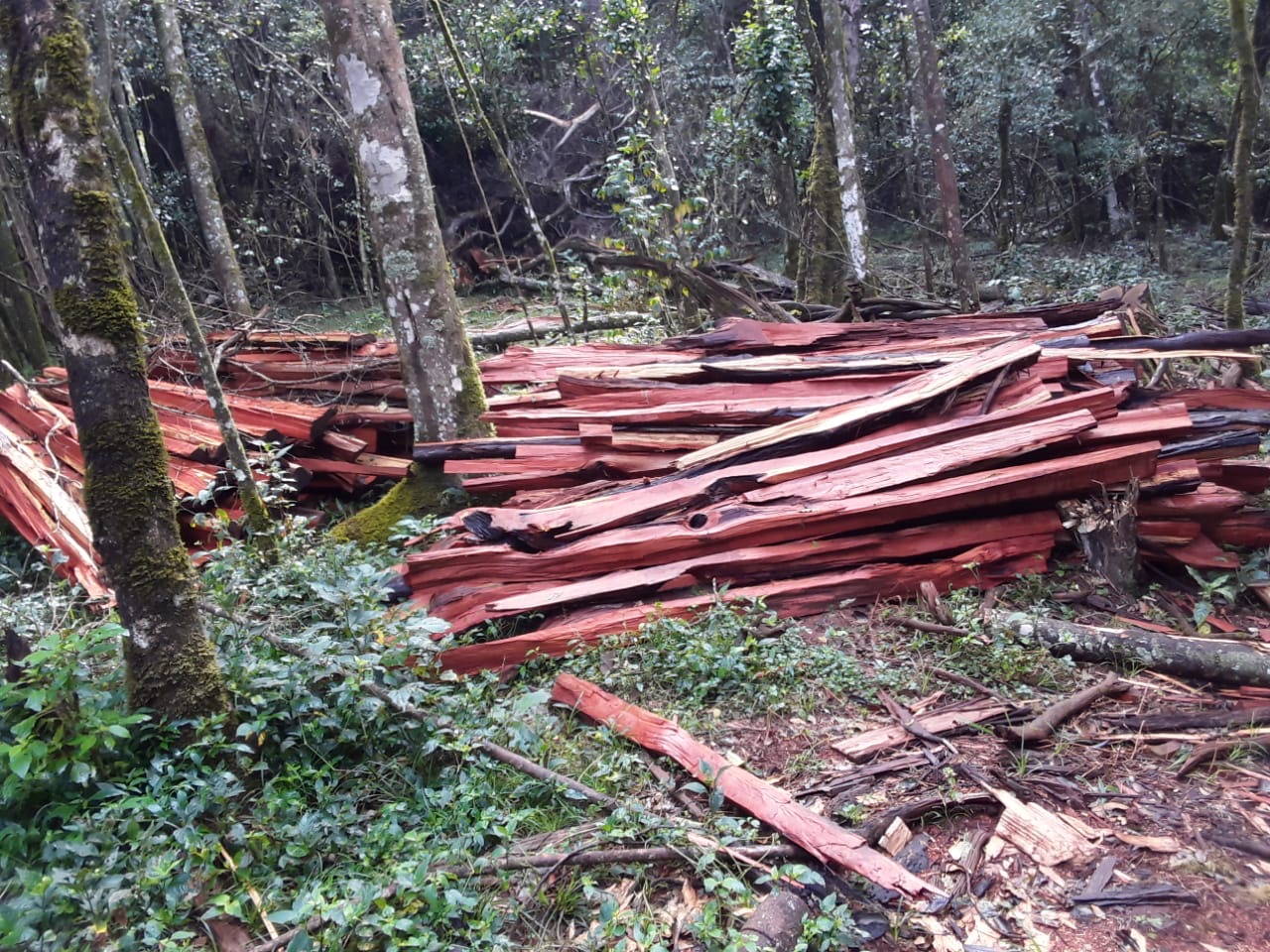
Cedar timbers recovered in June by MEP rangers.
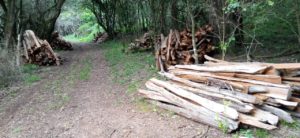 Aerial reconnaissance flights helped MEP rangers a lot by pinpointing the location of many illegal logging operations and sending coordinates to our teams on the ground. In April, as a result of an aerial patrol flight, the Loita team arrested three people for illegal logging, two people with a power saw that had been cutting down cedar posts, confiscated 1,244 cedar posts and 1,500 illegal logs. In June, in MNC, rangers seized a lorry transporting 180 sacks of charcoal and a lorry being transported from Lolgorian to Narok. On the other side of the Maasai Mau Forest area, rangers together with KFS and KWS confiscated seven power saws which were used to cut down indigenous trees and arrested various charcoal burners within the area. pictured left: Timber recovered in the Loita area by MEP rangers while on patrol.
Aerial reconnaissance flights helped MEP rangers a lot by pinpointing the location of many illegal logging operations and sending coordinates to our teams on the ground. In April, as a result of an aerial patrol flight, the Loita team arrested three people for illegal logging, two people with a power saw that had been cutting down cedar posts, confiscated 1,244 cedar posts and 1,500 illegal logs. In June, in MNC, rangers seized a lorry transporting 180 sacks of charcoal and a lorry being transported from Lolgorian to Narok. On the other side of the Maasai Mau Forest area, rangers together with KFS and KWS confiscated seven power saws which were used to cut down indigenous trees and arrested various charcoal burners within the area. pictured left: Timber recovered in the Loita area by MEP rangers while on patrol.
MEP ranger’s dedication and effectiveness has been unmatched as we continue having an impact on the illegal activities destroying forest habitats and will continue our steadfast commitment to support protection of wildlife, habitat and communities. As all indications continue to point to the fact that the situation is going to get worse in the Mara, MEP rangers continue to help when called to improve food security in the rural communities we work in. To this end, there were 34 incidents of human-elephant conflict in the second quarter that MEP rangers responded to help secure community’s fences and crops. We experienced persistent conflict in the Mararianda center in April where a group of stubborn bulls go right into the center to feed on the fruits of Warburgia Ugadensis (Elephant Pepper) trees. We had to push these elephants out of the center on a near daily basis.
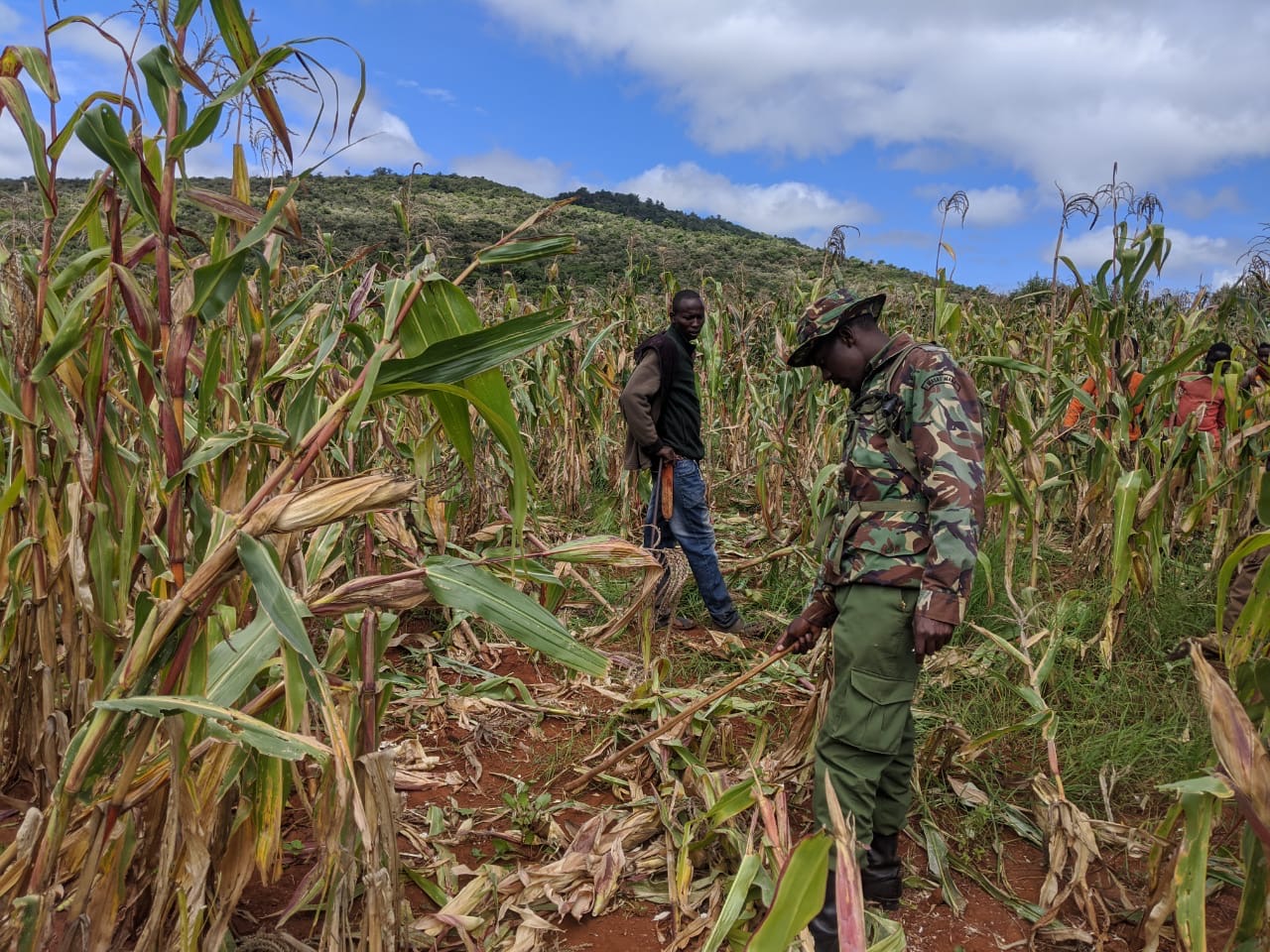
Conflict damage recorded on May 7.
There were increased requests from the community in the Naroosura area of Loita to help with mitigation efforts, so MEP deployed a ranger team to prevent crop raiding. The rangers have been chasing elephants out of these farms at night and have also been responding to illegal logging and assisting local administration to enforce curfew rules. Specifically, the area of Enkongu Enkare located in Naroosura has seen a high level of conflict in the last few weeks of May that MEP rangers responded to day-and-night to keep both elephants and the community safe. In June, tensions between elephants and the community hit a boiling point when on June 16, a young man was killed by an elephant in the Naroosura area during a conflict incident. The incident became politically charged and one of our rangers was injured on the head by a stone and received medical attention. We pulled our team out of this area for their own safety but more recently, we have had numerous calls from farmers to return to help them protect their farms at night. In the Transmara and Nyakweri areas, rangers together with KWS responded to various human wildlife conflict incidents involving Fitz and the MEP team stationed nearby was responding nightly to move the herd back into the forest. In response to this MEP and KWS sent a rapid response team to this area to increase security and respond to conflict.
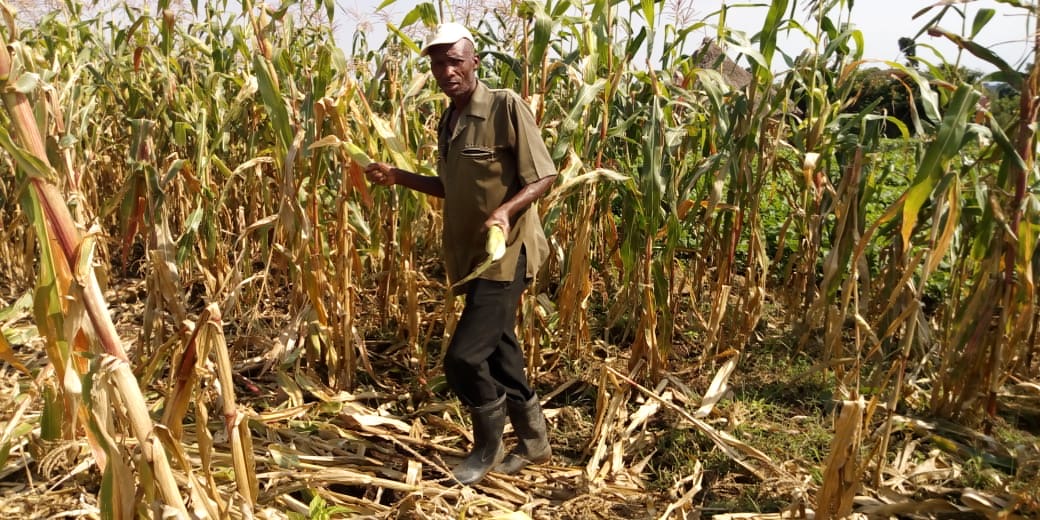 Crop damage photographed by MEP rangers responding to conflict in Naroosora on June 19.
Crop damage photographed by MEP rangers responding to conflict in Naroosora on June 19.
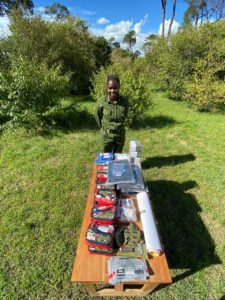 Finally, we wanted to thank the LEAD Ranger program that donated medical kits to MEP rangers in the second quarter (pictured left). Their donation included 12 Ranger Life Saver kits with tourniquets, chest seals, rescue sheets, compression gauze, micropore tape and emergency trauma dressings. Beyond the lifesaving kits, they sent reference posters and cards. The LEAD Ranger program vets and then partners with organizations like MEP to deliver free of charge best-practice training over a multi-year period to future leaders in conservation. Thank you to LEAD Ranger for the training and the medic equipment.
Finally, we wanted to thank the LEAD Ranger program that donated medical kits to MEP rangers in the second quarter (pictured left). Their donation included 12 Ranger Life Saver kits with tourniquets, chest seals, rescue sheets, compression gauze, micropore tape and emergency trauma dressings. Beyond the lifesaving kits, they sent reference posters and cards. The LEAD Ranger program vets and then partners with organizations like MEP to deliver free of charge best-practice training over a multi-year period to future leaders in conservation. Thank you to LEAD Ranger for the training and the medic equipment.


